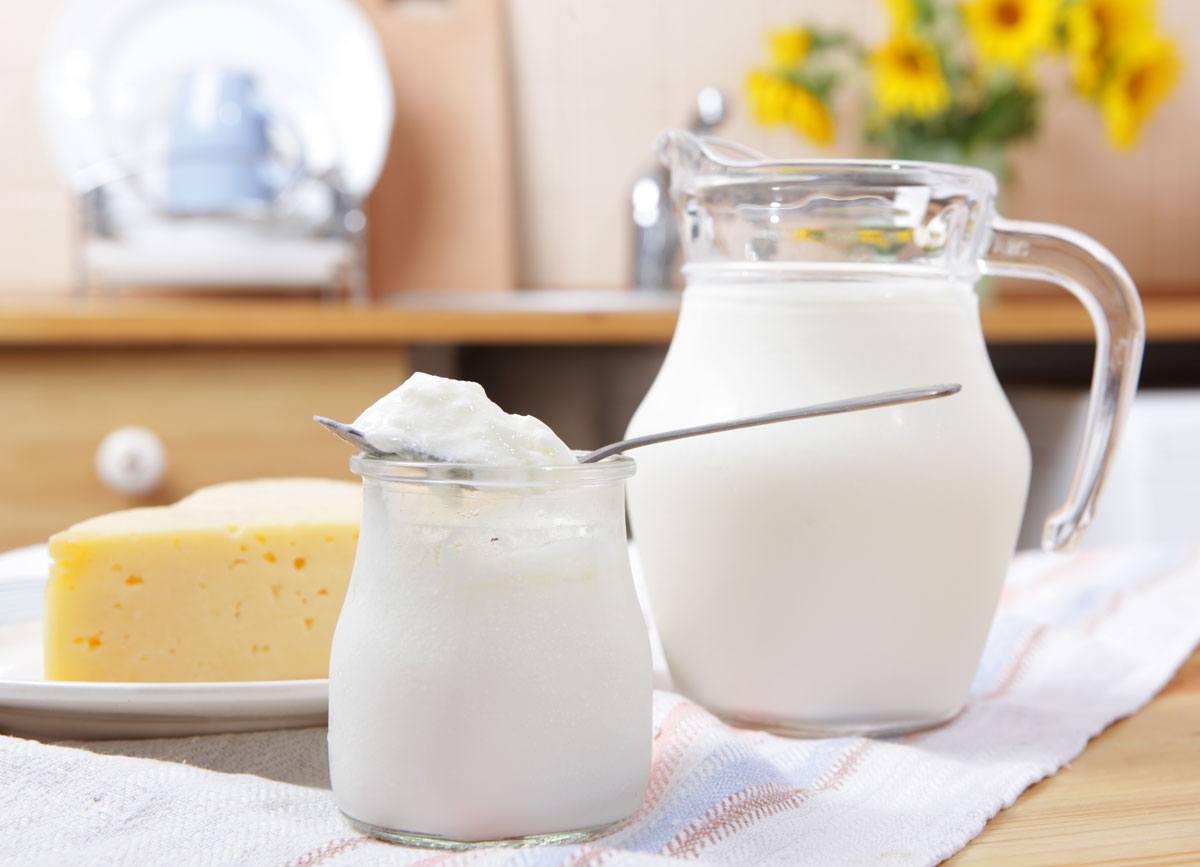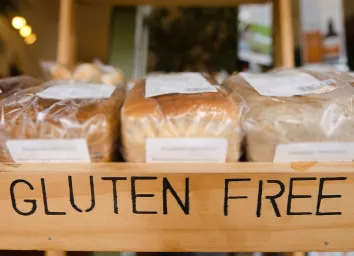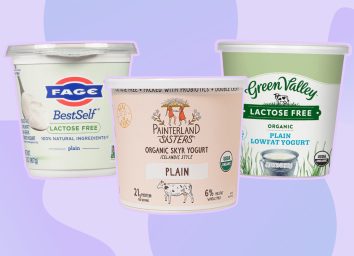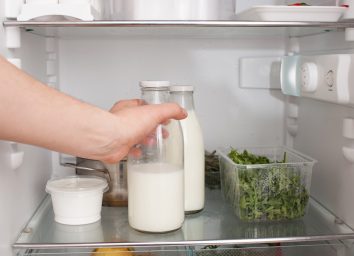Going Dairy-Free Doesn't Have to Be Complicated When You Have This Guide

Got milk? What about strong bones? These two dairy-centric mottos have been essential parts of the food industry marketing dairy to the masses for years now. But do we really need dairy in our diets? Is trying out a dairy-free diet possibly better for you?
Many of us lose the ability to break down lactose, the main ingredient in milk, as we get older. That seems like as good an argument as any that dairy is not necessarily essential to a healthy diet in adulthood, especially because it's roughly estimated that 65 percent of the world's population is lactose intolerant and humans are the only species that drink the milk of another animal into adulthood. But even if you don't suffer from an intolerance, it's worth asking: Is dairy an essential part of a healthy, adult diet or is it just marketed that way?
If the answer is, in fact, no, we don't need dairy to be healthy, then what are the possible side effects of living a life off of cheese, milk, and (delicious) ice cream?
If you notice some type of allergic reaction after eating dairy, then you might want to go dairy-free. But even if you don't have an allergy or an intolerance, there might be some other tell-tale signs of a diet laden with too much dairy. People who consume too much dairy might experience bloating, fatigue, and even a sinus infection that seems to never go away.
A diet high in dairy could also potentially cause inflammation, both internal and external, contributing to skin conditions such as acne and eczema. Feeling constantly sluggish or tired? Dairy might have something to do with that, too.
Whether you're dealing with intolerance, an allergy, or you simply want to be the best, healthiest version of yourself, following a dairy-free diet might be for you. We had nutrition experts weigh in on who should consider a dairy-free diet, what it actually entails, and what the advantages and disadvantages of this diet are.
What is a dairy-free diet?
In simple terms, a dairy-free diet is a diet free from lactose. Lactose is present in foods such as milk and cheese—basically anything on the "dairy" category of the food pyramid.
"Lactose is a sugar that is in milk; some people do not break down lactose well because they don't have lactase, which is the enzyme that breaks it down," explains Vanessa Rissetto, MS, RD, CDN, of Vanessa Rissetto Nutrition.
Dairy-free diets mean you omit:
- yogurt
- ice cream
- sour cream
- cottage cheeses
- buttermilk
- cheese
- milk
- baked goods that contain milk
While those might be the immediate foods that come to mind when questioning what constitutes as dairy, there are also a few other foods you might not realize also qualify, as they contain lactose.
"Foods like margarines, shortening, non-dairy creamers, and salad dressings can also contain lactose, so it's best to read labels," Rissetto says.
Though we know the big players in dairy—cheese, milk, yogurt, etc.—dairy, or lactose rather, could be hiding in even the most unexpected of foods. So, how do you know what to look for?
According to Rissetto, other ingredients to look out for that include lactose are:
- whey
- caseinates
- nougat
- cheese
- milk byproducts
- casein
- dry milk solids
- lactose
- butter
- curds
- non-fat dry milk
- dry milk powder
For an ultimate list of which ingredients to avoid, check out this list, courtesy of nutritionist Bonnie Taub-Dix, RDN, creator of BetterThanDieting.com, and author of Read It Before You Eat It: Taking You From Label to Table.
- butter
- buttermilk
- casein, casein hydrolysate, and caseinates
- cheese
- cottage cheese
- cream
- curds
- diacetyl
- ghee
- lactalbumin
- lactoferrin
- lactose and lactulose
- milk
- recaldent (in gum, mints, even toothpaste)
- rennet casein
- sour cream
- whey (in all forms)
- yogurt
Is a dairy-free diet the better option?
If humans truly don't need dairy in their diets, it might stand to reason that we are better off without it. Could it really be a better option?
"Nothing bad is going to happen if you don't eat dairy," says Rissetto.
In fact, after switching to a dairy-free diet, Rissetto says you might see some positive changes in your body. After all, it's no secret that dairy has been linked to skin conditions such as acne and eczema, as well as other internal forms of inflammation, such as bloating and gas.
"Dairy is a major cause of oils in the body and inflammation. [It's] known to aggravate acne," Rissetto says. "[You might also experience] better digestion as many people are lactose intolerant… While dairy does provide calcium, there are also studies that show too much milk can cause bone breakage."
Who is the dairy-free diet good for?
While there are no real disadvantages to switching to a dairy-free diet—other than missing out on yummy things like cheese and ice cream—you may want to consider if this diet is for you before wholly adopting it. Rissetto says if you have a lactose allergy, or would prefer to avoid animal by-products (vegetarian or vegan), then this diet might be a good fit.
However, cholesterol is not necessarily a factor. "People with elevated cholesterol levels need not avoid dairy as they can have low-fat variations," Rissetto says.
If I go dairy-free, am I vegan?
Not really. In a way, yes, because vegans are usually dairy-free, but veganism encompasses a few other things than solely cutting out dairy. Since vegans generally choose not to eat any animal byproducts, this also includes cutting out honey, eggs, all meat, fish, and poultry, and foods with gelatin and rennet.
Of course, you can be dairy-free and still eat meat, fish, and poultry. Remember: It's important to choose the diet that works for you, so don't think because you go dairy-free, you have to adhere to a specific diet that does not fit your individualized nutrition needs and wants.
What dairy-free alternatives should I buy?
Don't panic if you are newly dairy-free. While traditional cow's milk (and goat milk) and cow's milk cheese, yogurts, and ice creams are off the table for the dairy-free diet, that doesn't mean there aren't options for you. Of course there are. Welcome to the word of soy-, nut-, and coconut-based milks, creamers, ice creams, and more!
"When I look for dairy-free alternatives, I try to make sure those alternatives contain calcium and vitamin D," says Taub-Dix. "Almond Breeze almond milk, for example, is an excellent source of calcium and vitamin E and a good source of vitamins A and D. Almond Breeze almond milks also provide [fewer] calories than dairy milk."
Of course, you could always make your own almond milk at home using almonds (or nuts of your choice), filtered water, dates, and maple syrup for sweetener.
While almond milk is one nutritious option, there are also lactose-free milks (or "mylks") made from a base of either coconut, cashews, or oats. There are also many lactose-free ice creams available, made from either soy, nuts, or coconut.
Which nutrients do dairy-free diets need more of and how do I get them?
People who lead a dairy-free diet may be concerned about missing certain nutrients from dairy. Rightfully so! If you're worried about getting enough calcium or protein, there are plenty of other areas from which you can get these nutrients. It also might be worth consulting a nutritionist to make sure you're getting the nutrients you need.
"There is as much calcium in a stalk of broccoli as a glass of milk," assures Rissetto. "As for protein, [there's] more in a 4 oz piece of chicken—about 47 grams — versus 12 grams in a glass of milk."
There you have it—we've been looking for calcium in the wrong places all this time. Who knew broccoli had just as much calcium as milk?








